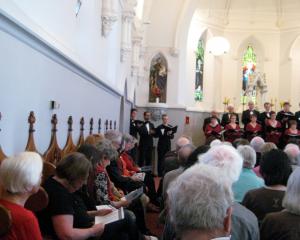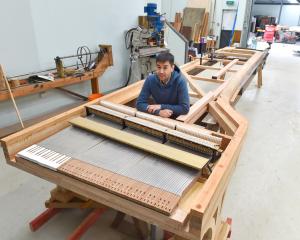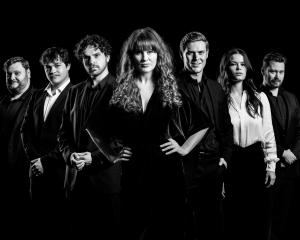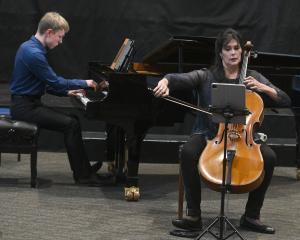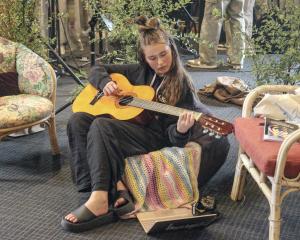Go back 10 years, almost to the day.
A couple (or a couple-to-be, perhaps) exit the bunker that has long doubled as a concert venue below the University of Otago Union. A young man, drenched in sweat, exclaims, "Man, that was wicked."
His female friend's reply is much more memorable: "Yeah, my bra broke."
Go back 10 years ago, almost to the day. New Zealand band the Datsuns graces the cover of influential, albeit fickle, British music magazine NME, its members being hailed as "heroes of the new rock revolution", a movement led at the time by The White Stripes, The Strokes, The Vines and company.
Go back 10 years. The Kiwi quartet had just seen itsself-titled debut album reach the top 20 of the British charts and signed a licensing deal with Richard Branson's V2 record label for a reported 200,000 for the rights to a second album.
Having been derided for (a) playing guitars, (b) enjoying raucous rock 'n' roll and (c) its members' long hair as teenagers growing up in Cambridge, Waikato, thoroughbred stud territory, the little-known band took a punt in 2002.
It borrowed $30,000, a sum that enabled it to accept an invitation to support The White Stripes in Australia and the United States. Several months later, those home-town cynics were a blur in the rear-view mirror as the Datsuns headed to London and began to tour ... relentlessly.
A decade on, as the band prepares to release its fifth album, Death Rattle Boogie, its members spend more time apart than they do together.
It's not that they don't get on; it's more a case of been there, done that. The long hauls are over; this vehicle is now parked up, ready for the occasional short burst around the block and back again.
Take guitarist Phil Somervell.
He's now living in Auckland, where he makes a crust by way of other talents. An itinerant squash coach, he roams from club to club in the big smoke.
"We spent so much time touring and living together in England and Germany at various times. But it got to a point where we weren't getting along as we'd like to," Somervell explains via telephone from his Ellerslie home.
"It wasn't a case of me thinking, 'Right, I'm going to go home and play squash'. I just wanted to come back and get more of a sense of balance, of normal life, really.
"Living in a suitcase for a decade gets to you after a while. It probably took me eight months to a year before I really felt settled enough to decide what I wanted to do.
"We decided that everybody could just live where they wanted to and we'd work it out from there. We just have to wing it. We've never really planned further ahead than six to eight weeks anyway.
"We tour maybe twice a year now. In the last three years we've been touring or recording in Europe so I might be away for three or four weeks at a time, then I'm back here," Somervell says.
"I still play music with other bands in Auckland. We all have other projects going on. And now when we get together it's a really good time."
Somervell's band-mates are well scattered: guitarist Christian Livingstone lives in London; Ben Cole, who replaced original drummer Matt Osment in 2003, is based in Wellington; and singer-bass player Dolf de Borst lives in Stockholm, Sweden, where he has built a recording studio with Nicke Andersson, formerly of Swedish hard rockers the Hellacopters.
Andersson, who now plays with De Borst in Stockholm-based band Imperial State Electric, produced Death Rattle Boogie, which makes sense, given the connection between him and the Datsuns.
"We've toured with the Hellacopters a lot," Somervell says. "There wouldn't really be the Datsuns as you know them today without the Hellacopters.
We saw them in 1998 and were blown away by them. We eventually hooked up with them.
"It's good to have someone who can be objective, someone outside the band who can tell you what take sounds good.
Otherwise you can get too involved.
"We recorded some stuff in Dolf's studio in Stockholm but we attacked those songs again from scratch at Roundhead [Neil Finn's Auckland studio].
That place is great ... not much compares to that big room there."
Despite its title, Death Rattle Boogie is no curtain call, Somervell says.
To be released on Friday on the Datsuns' own label, Hell Squad, and distributed in New Zealand by Border Music (international distribution deals are being worked out), the fifth album might lack any industry heavyweight backing, but it could well be the group's best effort yet.
"There have always been a lot of songs, whether we come up with them together or whether Dolf or Christian have written them individually.
There are always lots of ideas floating around. On other albums there have sometimes been up to 50 ideas and we then select the best 10, or the 10 we can agree on."
Although the Datsuns retain their furious fretwork on Death Rattle Boogie, clearly in evidence in album-opener Gods Are Bored, Bullseye, Axethrower and Goodbye Ghosts, other songs are more playful; Skull Full of Bone begins with a bassline Blondie would've died for, while Wander The Night features a smoky organ set to an almost soulful vocal and, believe it or not, jazzy guitar phasing.
"We are all music fans so we are always listening to lots of different music," Somervell says.
"With four guys spread around the globe, we tend to listen to what's going on around us. There wasn't a deliberate attempt to sound like this or that. We just let it flow along with our interests. Gold Halo is one example. There's definitely a heavy metal vibe to it - say, Black Sabbath or Motorhead - but then it has a psychedelic middle section.
"With this one, we were five albums in and thought we could make a longer one. I wanted to make a double album but the others weren't so keen on that."
The Datsuns plan to push the new album by doing an Australian tour in mid-December as well as playing Auckland and Wellington shows before Christmas. The band is looking at touring Europe in the middle of next year but, as Somervell points out, the schedule is nothing like it used to be.
The Datsuns followed up those heady days of 2002 by winning best album, best group and breakthrough artist at the 2003 New Zealand Music Awards, at which Somervell thanked those "few people" who had gone to see the band before it headed offshore to seek a more appreciative audience.
However, the group's second album, 2004's aptly named Outta Sight, Outta Mind, misfired, despite being produced by Led Zeppelin's John Paul Jones and subsequent efforts (2006 album Smoke & Mirrors and 2008's Head Stunts) failed to make the same impact as that self-titled debut.
Regardless, the band has covered plenty of ground since forming at Cambridge High School in 1995. United by a love for rock music in its rawer forms, Somervell and his mates have played Ozzfest, performing on the same stage as Ozzy Osbourne, Marilyn Manson and Korn, opened for Metallica on its Australian tour of 2004, taken to the main stage of the 2004 and 2009 Big Day Out festivals and rocked all sorts of clubs at all sorts of hours.
"It was a pretty wild there for seven or eight years," Somervell recollects.
"We played a show in France once that was reminiscent of a Mad Max movie.
"It was a 24-hour motorcycle race and they just had bands playing. There was no security apart from the odd gang. We'd be playing and there would be bonfires and fireworks going off in the middle of the crowd, people driving a van with naked people on top, motorbikes being ridden right up to the stage.
"It was more a case of us watching the crowd rather than the crowd watching us."
In a way, that sums up the Datsuns' ethos.
"We formed because we were bored and in a small town. We have just got by really. Any money we made went back into the band. But financial gain was never the intention," Somervell emphasises.
"The amount of world travel we have had, being able to get by for as long as we have has been great. We have to remind ourselves that we got into a band because it was fun.
"You can't put a price on the experiences we have had touring around. We've seen things no tourist would."
Hear it
The Datsuns' Death Rattle Boogie is released on Friday.



